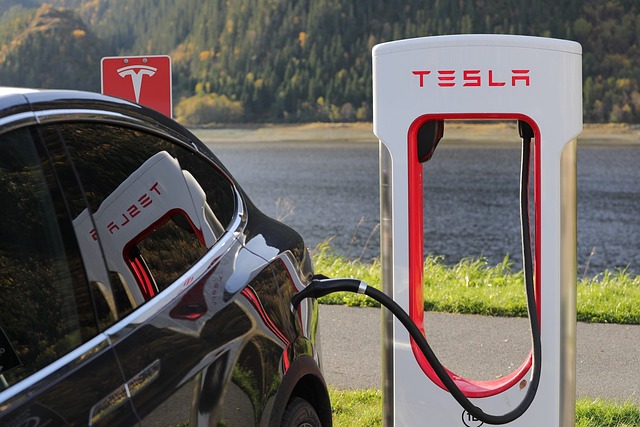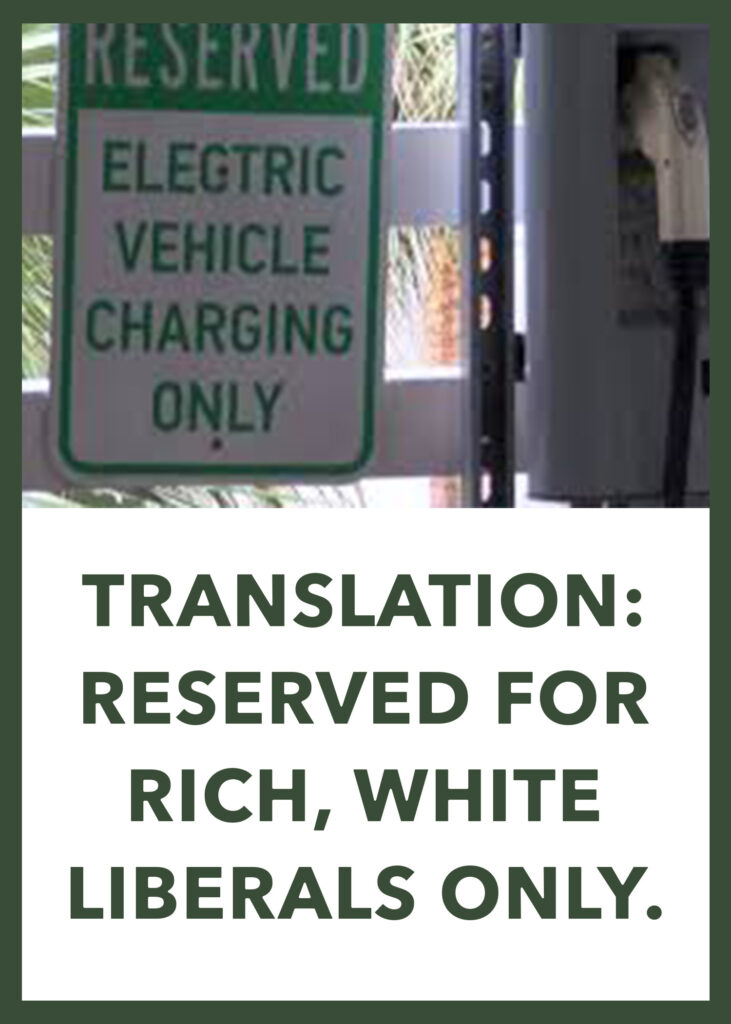VT Digger recently posted an article lamenting that we Vermonters are not heeling to the mandate to transition our vehicles to electric. Alas, “As of October 2023, there were just under 11,000 plug-in EVs registered in the state, David Roberts, a consultant for the Vermont Energy Investment Corporation, told the House Transportation Committee.
But meeting state emissions goals [under the Global Warming Solutions Act] for the transportation sector would require that there be about 27,000 plug-in EVs registered in Vermont by 2025 (including plug-in hybrids) and 126,000 by 2030.” We’re not going to get there. It’s totally unrealistic.
Why? WE CUSTOMERS/VOTERS DON’T WANT THESE FREAKIN’ CARS!
At least not nearly to the extent the climate alarmists in Montpelier demand. Still, they persist in forcing down our throats this technology that is too expensive and far too impractical for the overwhelming majority of drivers. This is bad policy on so many levels inflicted upon us by people who simply don’t care.
The growth in EV ownership in Vermont, what there is of it, is driven in large part by huge taxpayer and electric ratepayer subsidies that are grotesquely regressive. As VT Digger reports, “In an attempt to meet those targets, the state has introduced a slew of incentive programs in recent years on top of existing federal incentives to encourage Vermonters to go electric. The state programs include the Replace Your Ride program, which grants $3,000 to drivers who give in old cars that use fossil fuels, and the MileageSmart program, which offers Vermonters up to $5,000 to buy a used plug-in EV or hybrid.”
This is on top of government subsidy money doled out directly to auto manufacturers. In 2023, for example, the Biden administration offered $12 billion in grants and loans for automakers and suppliers to retrofit their plants to produce electric vehicles – THAT CONSUMERS DON’T WANT.
That’s all money transferred from hard-working Vermonters’ bank accounts to a politically favored class of drivers – who are by and large wealthier than those paying the bills.
Energy reporter Robert Bryce just published a fantastic article on just how regressive and politically motivated the EV push really is, and who is taking advantage of all this taxpayer-funded largess.
Last October, researchers at the University of California, Berkeley, released a remarkable study that found “counties with affluent left-leaning cities” like Cambridge, San Francisco, and Seattle [and Burlington?] “play a disproportionately large role in driving the entire national increase in EV adoption….”
87% are white. Last March, Gallup reported, “a substantial majority of Republicans, 71%, say they would not consider owning an electric vehicle.”
So, what’s happening here is that lower-income tax/ratepayers are being forced to subsidize the climate fetishes and virtue signaling of rich, white liberals.
Beyond these more person-to-person wealthfare transfers, Bryce cites statistics showing that the money is overwhelmingly flowing into wealthier, liberal cities and states — another form of wealth transfer.
Despite all this, Automakers are, according to NASDAQ, “already losing money on their EV investments. Ford, for example, lost about $36,000 for every EV it sold last quarter.” Bryce cites bigger numbers:
Ford reported an operating loss of $1.3 billion in its EV division during the third quarter. That translates into a loss of $62,016 for each of the 20,962 EVs it sold during the period. means that FoMoCo has already lost about $3.1 billion on its EV business this year. As I noted in these pages in July, the company said it expected to lose $4.5 billion on its EV business in 2023.
Honda and General Motors “were ending a $5 billion plan to develop lower-cost EVs together just a year after announcing the effort.”
This is not to use a favorite term on the Left, sustainable.
In other news, the rental car company Hertz just announced that they are dumping 20,000 electric vehicles and switching back to gas-powered vehicles. “Morgan Stanley analyst Adam Jonas said in a note Hertz’s move was another sign that EV expectations need to be “reset downward”. (Source: Reuters)
Last month, 3900 car dealers sent a letter to President Biden stating, “The reality, however, is that electric vehicle demand today is not keeping up with the large influx of BEVs arriving at our dealerships prompted by the current regulations. BEVs are stacking up on our lots,” and urging the administration to back off unrealistic EV mandates. Further, they state the obvious that such goals “require consumer acceptance to become a reality. With each passing day, it becomes more apparent that this attempted electric vehicle mandate is unrealistic based on current and forecasted customer demand.”
Reality, however, is not a concept the Vermont supermajority in the legislature is familiar with. Nor is any concern for the actual policy preferences of a majority of their constituents. In fact, at the first meeting of the Senate Natural Resources & Energy Committee in their discussion of priorities for 2024, Senator Mark MacDonald (D-Orange) expressed his desire to “Stop the practice of selling cars, trucks, and SUVs that burn gas.”
Asked if he thought Vermont joining the California Clean Cars Initiative, which phases out the legal sale of ICE vehicles by 2035 wasn’t enough, MacDonald said no, “I’d like to get ahead of that.” To which his colleague Senator Becca White (D-Windsor) enthusiastically pointed to her own bill to do just that, S.24, An act relating to the Clean Fuels Program.
To which I reply, screw these people and the horses they expect us all to ride in on.

